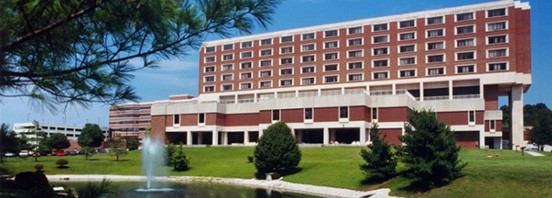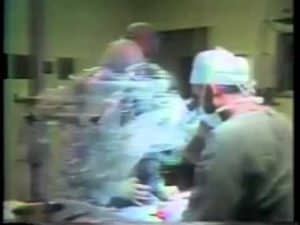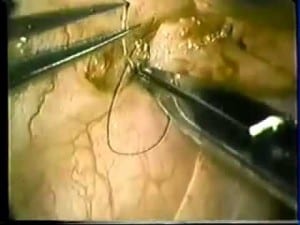What are Dr. Silber’s success rates?
For patients who require only vasovasostomy which just reconnects the cut ends of the vas deferens, our success rate is virtually 100%. Vasovasostomy however will not work at all if there is epididymal obstruction. This occurs in 85% of patients today, and therefore a more complex microsurgical vasoepididymostomy is needed. This procedure cannot be performed in an office setting.
Dr. Silber has a 95% success rate for vasoepididymostomy, which connects the vas deferens to the epididymis. This is only done when there is epididymal obstruction. When there is epididymal obstruction (85 percent of cases nowadays) just reconnecting the vas cannot possibly work.
What surgery technique will I get?
The surgery technique will be determined at the time of surgery. If there is epididymal obstruction, then it will be vasoepididymostomy. If there is no epididymal obstruction then it will be vasovasostomy.
If there is epididymal obstruction, Dr. Silber will bypass the blowouts and blockages in the epididymis that have formed from pressure increase after vasectomy. Whichever procedure is necessary will be determined at the time of surgery, and there are no extra fees at all if the more complex procedure is required. It will all be done at one time.
At the time of your surgery, high quality sperm will be retrieved, and stored at no extra fee, as a backup in case you should ever need IVF (about 3 to 5 per cent of cases).
Is there any advantage to vasectomy reversal over just retrieving my husband’s sperm surgically and using it for IVF with me?
We can do either of course. Most couples prefer a successful vasectomy reversal, because the wife does not then have to go through all the aggravation and extra expense of IVF just because her husband has had a vasectomy. The infertility is NOT her fault, and so it makes sense not to make her go through a lot of shots and costs and discomfort when we can just return the husband’s fertility to him. Either way he would need surgery anyway, either to reverse his vasectomy, or to retrieve blocked up sperm to use for IVF. But some couples will prefer sperm retrieval and IVF, and we are masters at that, and would be happy to do that if that is your choice.
When can we try to conceive?
At any time four weeks or longer after surgery you can begin having intercourse and trying to get pregnant. I recommend frequent intercourse rather than trying to “save it up” for ovulation. I explain this approach fully in my book, “How To Get Pregnant.”
Do you offer financing?
You can either use a credit card or we can counsel you with lists of reliable credit companies that do the financing.
Is there any post-op pain?
Virtually painless. All you are likely to need is extra strength Tylenol. We avoid swelling which would be the cause of the pain, and use a long acting 4 day local anesthetic that will make you remarkably comfortable. All surgeries are performed in an operating room under general anesthesia so that Dr. Silber can free up enough vas to make the connection without tension, so that the testicles will hang naturally.
All bleeders are cauterized with meticulous skill to minimize swelling, and proper surgical drains are in place to prevent any painful swelling at the surgery site.
Why are Dr. Silber’s success rates so high?
Dr. Silber, a micro-surgeon, will only make a connection to where he finds live, motile sperm, at which time he will aspirate and freeze sperm to be used as backup with IVF. But the most important thing is that he will bypass all of the blockages, not just the vasectomy site. Furthermore, his microsurgical skill is second to none in the world. This very high level of microsurgical skill is required to get a perfect reconnection of such a small duct, and is crucial for bypassing all the blowouts and blockages, even in the most difficult areas.
Is my vasectomy too old to be reversed?
No. Dr. Silber pioneered the procedure to bypass blowouts and blockages that can be formed over the years after a vasectomy. The length of time since vasectomy is no longer any deterrent to a successful result.
Are second-attempt vasectomy reversals successful?
Yes. Dr. Silber will clean up the scar tissue from your previous unsuccessful surgery, and make a connection to where he finds live, motile sperm. Reversals usually fail if the first doctor did not use a microsurgical technique or did not bypass the blowouts or blockages, or if the surgeon is not certified with years of experience in this procedure. In Dr. Silber’s hands, results are just as good with previous failed reversal cases as when there was no previous surgery attempts.
Why are some clinics offering outpatient surgery?
These offices are only performing a vasovasostomy under a local anesthetic, with no microsurgical expertise and no chance for success. First time vasectomy reversal failures occur when the procedure is not performed in an accredited operating room, under general anesthesia using microsurgery techniques.
Dr. Silber pioneered the procedure to bypass blowouts and blockages that form several years after a vasectomy. It is crucial for success, and no one in their right mind would suggest this can be done in an office setting.
The only reason amateurs are offering this in their office setting is to keep all of the overhead so they can make a bigger profit, and so they can appear to be charging less for the same procedure. But this is snake oil salesmanship that is demeaning to the patient and to the medical profession.
What is the recovery?
You should not drive (but you can be driven) and should not work for one week. You may return to work with light duty restrictions of not lifting anything over 10 lbs. for the next few weeks. You may resume exercise, sports and heavy lifting four weeks post-op. Any doctor who says you can avoid these restrictions is risking all the time and effort you have put into having a successful result.
If you have any questions, you may call us at (314) 576-1400.




